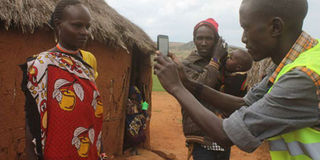How county, Amref use app to increase NHIF membership

A community health volunteer takes a photograph of Miriam Nkala for NHIF registration, at Kimugandura village in Laikipia County on March 22, 2018. PHOTO | JOSEPH KANYI | NATION MEDIA GROUP
What you need to know:
- Governor Ndiritu Muriithi terms the enrolment to the NHIF a big success, with 40,000 new households having been registered so far.
- A big percentage of the residents spends between Sh500 and Sh1,000 on medication, yet they are not into any medical health insurance scheme.
Ms Pogonyi Litalo has delivered five of her children at home in Segera Ward, Laikipia County.
But on a wet Tuesday, three community volunteers arrived at her mud hut armed with a phone app and a message; she needs to register for National Hospital Insurance Fund (NHIF) and give details of her household income and how much they spend on medicine.
The Maasai are patriarchal community and she could not give the information without her husband being present.
So she called her husband, Mr Francis Letiyalo.
And after persuasion, the volunteers registered the family with NHIF using M-Jali App, an application developed by Amref and the Laikipia County government.
MEMBERSHIP
The app has shaped how the county is enrolling residents to the national health insurer and also collected vital data on health in the expansive county.
Governor Ndiritu Muriithi terms the enrolment to the NHIF a big success, with 40,000 new households having been registered so far.
He is optimistic by the end of the year, every homestead will have an NHIF card, and will have achieved one of his campaign pledges of achieving a universal healthcare.
MEDICATION
The entire project of ensuring everybody has insurance cover will cost the county government Sh150 million.
But it is the data that also makes for interesting reading.
The poorest, for instance, showed more interest in joining the scheme.
Those who told volunteers that they earn between Sh2,500 and Sh4,999 enrolled faster than respondents with a monthly income of more than Sh15,000.
A big percentage of the residents spends between Sh500 and Sh1,000 on medication, yet they are not into any medical health insurance scheme.
While majority (60 per cent) cited lack of money for not enrolling, 28 per cent of those interviewed cited lack of awareness.
INSURANCE COVER
Besides capturing and storing the social-economic data of the individual, the App assists in remitting the Sh500 monthly contribution.
Residents can also pay as little as Sh20 daily through mobile phone money transfer process.
The app can also work offline, ensuring they are able to capture the data even in areas with no phone network.
It is then automatically uploaded when they reach an area covered by the network
On the background of big rocks and surrounded by his bleating goats, Mr Letiyalo narrates that a visit to a hospital in February might have tilted the scales towards NHIF.
“It is only last month that I took my wife to a private clinic and parted with Sh1,550.
"Medical care has been consuming a chunk of my earnings, but [I] have never considered a health insurance cover as an affordable remedy,” he said at his Kimagandura village home.
COST
He said the process of filling numerous forms and taking the entire family to be photographed and the process of acquiring birth certificates has in the past discouraged him.
His first born is aged 10 while the last born is 11 months and spent on average Sh1,000 a month on health care.
“If all I will be required to do is to send Sh20 daily, then it is not only manageable but exciting considering my family is fully covered,” the 30-year-old, who also operates a boda boda at Naibor Market, said.
REGISTRATION
Mr James Kanu, who is based at the Naibor Unit in Laikipia North Sub-County, said lack of birth certificates is not a hindrance to registration since they are allowed to capture birth details from the child immunisation card.
“Once we visit a home and the head of the family agrees to enrol, this phone is equipped to capture all the required details including taking and storing the photos of the beneficiaries.
"The level of acceptance is high owing to the simplicity of the process,” he explained, adding that he and a colleague, Ms Lucy Njaramba, have visited 1,987 households in two months.
Besides enrolling families into NHIF, the pair has also been registering expectant women into the Linda Mama programme which is an initiative of national government.




